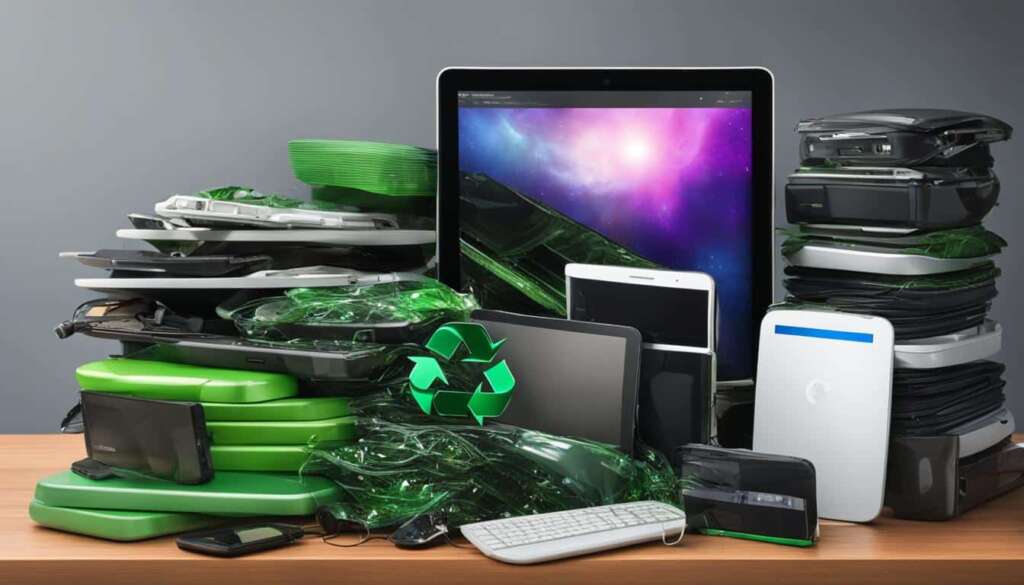Table of Contents
Electronic waste or e-waste refers to any discarded electronic devices, such as smartphones, computers, or appliances. With the increasing availability and use of technology comes a significant amount of e-waste generated every year. Unfortunately, this electronic waste is hazardous to our environment and health, as many electronic devices contain toxic components such as lead, cadmium, and mercury.
It is crucial to recycle electronic waste responsibly to reduce the environmental impact and prevent the release of harmful substances into the surroundings. Recycling e-waste not only helps to conserve natural resources but also creates job opportunities and helps in reducing greenhouse gas emissions.
Key Takeaways
- E-waste refers to discarded electronic devices such as smartphones, computers, or appliances.
- Electronic waste is hazardous to our environment and health as they contain toxic components such as lead, cadmium, and mercury.
- Recycling e-waste is crucial to reduce environmental impact and prevent the release of harmful substances into the surroundings.
- Recycling e-waste not only helps to conserve natural resources but also creates job opportunities and helps to reduce greenhouse gas emissions.
- By understanding and adopting sustainable recycling practices, we can contribute to a greener future.
Defining E-Waste: An Overview
In today’s technological age, electronic waste or e-waste is generated at an alarming rate, causing environmental hazards. Defining e-waste includes all discarded electronic devices, appliances, and gadgets, including IT equipment and telecommunication devices. E-waste also includes materials like wires, motherboards, circuit boards, batteries, and monitors, which are derived from electronic devices and can pose environmental challenges when disposed of improperly.
E-waste can be categorized into two types: hazardous and non-hazardous. Hazardous e-waste comprises old CRT monitors, LCD monitors, plasma screens, and other electronic devices that contain toxic materials such as lead, mercury, cadmium, and chromium. Such materials can contaminate soil, water, and air when they are released into the environment.
The non-hazardous e-waste category consists of equipment that does not require special treatment when discarded, such as printers, scanners, keyboards, mouse, and other non-toxic electronic waste material. However, businesses still need to dispose of non-hazardous e-waste responsibly by ensuring that e-waste is sent to a reputable recycler instead of a landfill.
| E-waste Type | Description |
|---|---|
| Hazardous | Contains toxic materials; pose environmental hazards |
| Non-hazardous | Do not contain toxic materials, but still require responsible disposal |
The Significance of Defining E-Waste
Defining e-waste is crucial in understanding the implications of improper disposal. With a clearer definition, businesses and individuals can take steps to dispose of electronic waste responsibly and prevent environmental contamination. When electronic waste is recycled properly, valuable materials can be recovered, which conserves natural resources, saves energy, reduces greenhouse gas emissions, and creates jobs in the recycling industry.
The Hazards of E-Waste and the Need for Responsible Recycling
Improper disposal of electronic waste can lead to severe environmental and health hazards. Electronic devices contain toxic materials such as lead, cadmium, and mercury, which pose a significant risk to the ecosystem and human health.
For instance, exposure to lead can cause developmental problems and affect the central nervous system, while cadmium can lead to lung and prostate cancer. Furthermore, mercury can damage the kidneys and the brain, leading to memory loss and tremors.
When electronic waste is not recycled responsibly, these toxic materials can pollute the soil, water, and air, causing severe health issues for people, animals, and plants alike. It is therefore critical to ensure that electronic waste is recycled in a responsible and sustainable manner.
By embracing sustainable recycling practices, we can reduce the hazards of e-waste and contribute to a greener future for our planet.
The Importance of Responsible Recycling Methods
Responsible recycling methods are crucial to minimizing the risks associated with electronic waste disposal. Recycling not only reduces environmental pollution but also conserves natural resources and energy.
There are several ways to recycle electronic waste, including refurbishing and donating electronic devices, selling them to certified recyclers, and participating in e-waste collection events.
The Role of Manufacturers in Responsible Recycling
Manufacturers also have a crucial role to play in ensuring responsible recycling practices for electronic devices. They can design products with environmentally friendly materials, reduce the use of toxic components, and implement efficient recycling programs.
Through joint efforts from individuals, communities, and manufacturers, we can create a sustainable future and minimize the hazards of e-waste on our planet.
Conclusion
To conclude, it’s essential to understand the severity of e-waste and its impact on our environment. We must take responsibility for our electronic waste and adopt sustainable practices to minimize its harmful effects. By recycling smartly and responsibly, we can ensure that our discarded devices are diverted from landfills and improperly managed facilities. Instead, these materials can be repurposed to create new products and reduce the reliance on virgin materials.
Moreover, reducing e-waste can reduce the emissions of greenhouse gases, which contribute to climate change. Therefore, as individuals, we must embrace the responsibility of managing our electronic waste to contribute to a sustainable future.
In summary, by understanding the concept of e-waste, its hazards, and the significance of responsible recycling, we can pave the way for a cleaner, healthier planet. So, let’s join hands and take a step towards a greener future by recycling our electronic waste in an eco-friendly manner.
FAQ
What is e-waste?
E-waste refers to electronic waste, which includes discarded electronic devices such as computers, smartphones, televisions, and appliances. These items can pose environmental and health risks if not properly disposed of or recycled.
Why is it important to recycle e-waste?
Recycling e-waste is crucial because electronic devices contain hazardous materials such as lead, mercury, and cadmium. When improperly discarded, these substances can contaminate soil, water, and air, posing significant risks to human health and the environment. Recycling e-waste helps recover valuable materials, reduces the need for raw materials, and minimizes environmental impact.
What are the hazards of e-waste?
E-waste contains toxic components that can be harmful if not handled properly. When disposed of in landfills or incinerated, hazardous substances can seep into the soil, water sources, and the atmosphere, contributing to pollution and health problems. Responsible recycling of e-waste is essential to prevent these hazards and protect both the environment and human well-being.
What are responsible recycling methods for e-waste?
Responsible recycling methods for e-waste involve ensuring that electronic devices are properly and safely dismantled. This includes separating hazardous components and materials for appropriate disposal or reuse. It is essential to choose certified e-waste recycling facilities or collection programs that adhere to environmental regulations and use environmentally friendly processes.
How can recycling e-waste contribute to a greener future?
By recycling e-waste, valuable materials like copper, gold, and silver can be recovered and reused. This reduces the need for mining and extracting raw materials, conserves energy, and minimizes carbon emissions associated with manufacturing new electronic devices. Furthermore, responsible e-waste recycling helps prevent pollution, conserves natural resources, and promotes a more sustainable and circular economy.













